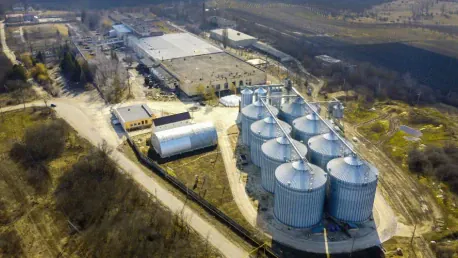In a bold and visionary move, Danish companies, including Ørsted and Copenhagen Airport, have joined forces to develop an ambitious green hydrogen and sustainable transport fuel facility in Copenhagen. This pioneering initiative aims to leverage renewable hydrogen as a clean alternative to traditional fossil fuels, offering an innovative solution to reduce carbon emissions across various modes of transport. With prominent partners such as Maersk, DSV Panalpina, DFDS, and SAS onboard, the project takes a comprehensive, cross-sector approach to address the growing demand for sustainable energy sources in Denmark and beyond.
Phased Implementation and Technological Innovation
The project is slated for execution in three meticulously planned phases, each designed to progressively scale up production capacity and technological capability. The first phase, anticipated to commence in 2023, involves constructing a 10MW electrolyzer to generate renewable hydrogen targeting use in buses and trucks. The usage of this clean fuel in public and commercial transportation is expected to significantly reduce carbon emissions, marking an essential step towards Denmark’s broader environmental objectives.
By 2027, the project will expand into its second phase, scaling up to a 250MW electrolyzer powered by renewable electricity from the nearby Bornholm offshore wind farm. This phase introduces carbon capture technology, enabling the production of renewable methanol intended for maritime and aviation fuel. Integrating carbon capture not only enhances sustainability but also sets a precedent for other global energy initiatives looking to reduce carbon footprints. The ultimate goal of this phase is to widen the scope of renewable energy usage across multiple sectors simultaneously.
The final and most ambitious phase, slated for realization by 2030, aims to increase the facility’s capacity to 1.3GW, producing over 250,000 tonnes of sustainable fuel annually. This considerable output is projected to displace around 30% of fossil fuel consumption at Copenhagen Airport, heralding a new era of sustainable aviation and transport. Each phase builds upon the previous one, showcasing a structured yet dynamic approach to achieving large-scale environmental impact.
Impact on Denmark’s Environmental Goals
This groundbreaking initiative aligns seamlessly with Denmark’s broader environmental goals, notably the target to reduce carbon emissions by 70% by 2030. The collective effort emphasizes the critical role of collaboration in achieving such ambitious objectives. Thomas Woldbye, CEO of Copenhagen Airport, stressed the importance of producing sustainable fuel in requisite quantities to support the country’s aspiration of attaining zero carbon emissions in Danish aviation by 2050. Such endeavors are vital to realize these long-term goals, underscoring the project’s importance on a broader national scale.
The project’s success is also endorsed by the Municipality of Copenhagen, reflecting its vital socio-political backing. It is anticipated to produce a significant reduction of 850,000 tonnes in annual carbon emissions, a remarkable contribution to Denmark’s sustainability drive. The project aims not only to serve as a benchmark within Denmark but also to inspire international replication, potentially transforming global sustainable fuel production paradigms.
The collaborative nature of this initiative underscores the synergy between public and private sectors committed to environmental sustainability. If successful, the Copenhagen project could become a blueprint for other cities and nations aiming to transition to renewable energy sources, ultimately accelerating global efforts to combat climate change.
Renewable Hydrogen and the European Context
In the larger European context, Denmark’s project aligns with a growing consensus among major electricity companies, including Enel, Iberdrola, Ørsted, and EDP, urging the European Commission to prioritize renewable hydrogen in its pandemic recovery plan. Renewable hydrogen is seen as a cornerstone for a low-carbon economy, despite current challenges where 95% of hydrogen is derived from fossil fuels. The call for prioritization highlights hydrogen’s transformative potential despite the current dominance of fossil-fuel-based hydrogen production.
RenewableUK has forecast rapid growth potential for green hydrogen to meet climate goals, emphasizing the need for enabling policies and abundant renewable resources. The project in Copenhagen, coupled with European policy support, highlights a concerted effort across multiple regions to elevate renewable hydrogen as a key component in future energy strategies. With its extensive renewable resources and forward-thinking policies, the UK is particularly well-positioned to become a leader in green hydrogen, which could play a crucial role in decarbonizing heavy industries and the transportation sector.
Henrik Poulsen, Ørsted’s chief executive, underscored the necessity of decarbonizing road, maritime, and aviation sectors to achieve global net-zero emissions by 2050. He noted that the Greater Copenhagen project sets the stage for making renewable fuels cost-competitive, reinforcing Denmark’s leadership and innovation in sustainable technologies and business models. Poulsen’s insights reflect a broader vision of green hydrogen as an integral element in reaching global climate targets, indicating the project’s potential ripple effect on international energy markets.
Conclusion and Future Prospects
In an ambitious and forward-thinking initiative, Danish companies, including Ørsted and Copenhagen Airport, have teamed up to create a cutting-edge green hydrogen and sustainable transport fuel facility in Copenhagen. This groundbreaking project seeks to use renewable hydrogen as a clean substitute for conventional fossil fuels, solving a critical need to cut down carbon emissions across various transportation sectors. Key collaborators, such as Maersk, DSV Panalpina, DFDS, and SAS, have joined this effort, ensuring a broad, cross-sector strategy to meet the rising demand for sustainable energy in Denmark and beyond. This collaboration underscores a significant commitment to transitioning from traditional energy sources to cleaner, greener alternatives. The development of this facility is not just a local endeavor; it has the potential to serve as a model for global initiatives aimed at environmental sustainability. By addressing the adverse impacts of fossil fuels, this project aspires to contribute substantially to the fight against climate change, demonstrating leadership in green energy innovation.









